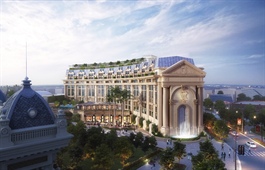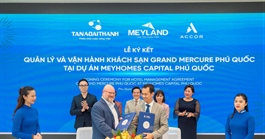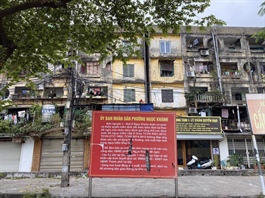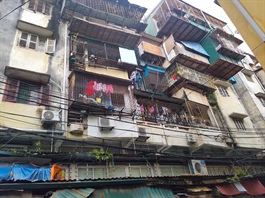Hanoi’s property supply drops in Q3 2022
Hanoi’s property supply drops in Q3 2022
The city is facing a shortage of real estate supply, while the implementation of approved projects is stalled due to the tightening of credit policy and procedural difficulties.
Hanoi’s real estate supply in the third quarter of 2022 continued to drop 39% from the same quarter last year to 3,600 units, according to the city’s Department of Construction.

The real estate offer in the city is still scarce and no new projects are being carried out. Photo: Sunshine Group |
Meanwhile, the decline in supply in the third quarter (Q3) of 2021 was reported to be lowest compared to the same period of the previous years, the department said.
In this Q3, the new units’ supply came from existing projects, mainly in Hoang Mai, Long Bien and Ha Dong districts. The supply of luxury and mid-priced apartments accounted for most of the supply. Most projects are located in districts away from the city center, where land reserves are still abundant for real estate development.
The department said that more than 600 units were in transaction, representing 10% of sales volume. The figure was lower than the previous year, when more than 1,700 units were sold.
The new supply for sales came mainly from Khai Son City Urban Area (Long Bien District), Sunshine Garden (Hai Ba Trung District), Thanh Lam – Dai Thinh 2 Urban Area (Me Linh District), Green Diamond and T&T Pham Ngoc Thach (Dong Da District), and Hanoi Melody Residences (Hoang Mai District).
Due to the low supply, prices of luxury and mid-priced apartments remain high.
The average price of new mid-priced apartments in Eurowindow River Park, Binh Minh Garden and Le Grand Jardin Sai Dong projects in the districts of Long Bien and Me Linh rose by 10% to VND38-40 million ($1,589-$1,673) per square meter compared to the same period of 2021, and 2% against the previous quarter of this year.
Such increase was similar to that of the low-rise housing segment. Due to such the high price, the sale number of projects in Ha Dong and Hoang Mai districts was low, according to the department.
According to Hanoi's Department of Construction, the city's real estate supply remains tight and, so far, comes mainly from approved projects, due to a tighter credit policy and procedural difficulties, leading to many projects not being able to be implemented.
A representative from Cushman & Wakefield Vietnam said real estate prices will continue to increase because input costs in projects are high due to fluctuations in land values, construction material prices, and labor costs.
The real estate services firm added foreign-direct investment (FDI) inflows continued to be the encouraging sign for the economy and real estate. The Vietnamese Government is accelerating the implementation of many infrastructure projects and real estate transfer tax, as well as focusing on social housing development. It will help the whole market have more sustainable growth in the coming time.



























